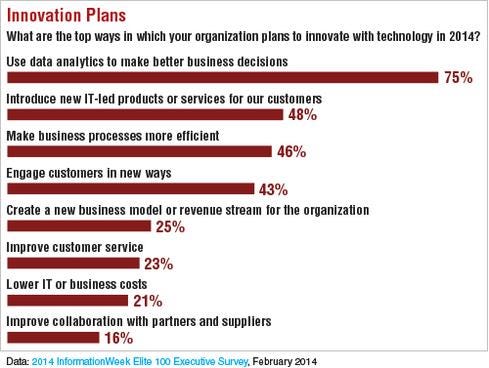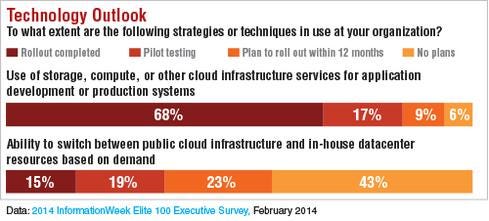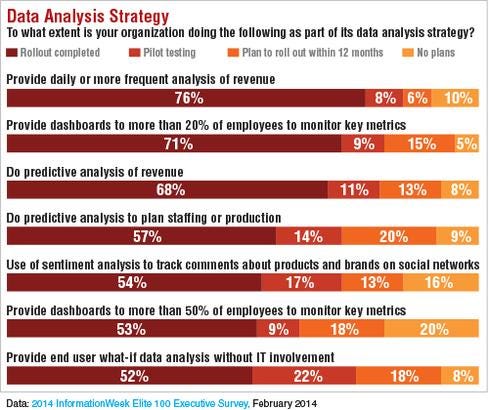InformationWeek Elite 100: Winning Digital Strategies
Forget "disruption." The most innovative companies in our annual ranking go digital in two main ways.

"Digital disruption" is the term du jour, but I have two big problems with it.
One, it evokes an image of a sudden event, like a rival bursting onto the scene and threatening your company's marketing standing, when the real threat is the slow but relentless digital drive of rivals that at some point leaves legacy players at an impossible disadvantage.
Two, it suggests that "digital" is some singular weapon, or a singular channel like e-commerce. Instead, digital business, particularly for established companies, describes the more systematic process of choosing where and how to apply new digital technologies and business approaches -- and where to avoid them.
[For more InformationWeek Elite 100 coverage and a complete listing of the top 100 companies, click here.]
Here are a few examples: Kroger is using people-counting sensors at its grocery store cash registers to alert managers when lines are piling up. Merck is using new data collection and analysis models to improve the reliability of its vaccine manufacturing process. Capital One lets credit card customers convert a cash purchase of a plane ticket to one using reward points, even months after the buy, with a feature called Purchase Eraser.
These examples show digital business woven into everyday operations, and it's examples like these that we celebrate in our just-announced InformationWeek Elite 100 awards. (As the name suggests, the Elite 100 is our more-selective annual ranking of business technology innovators, a successor to the InformationWeek 500 ranking that we've done the previous 25 years.)
Think of digital business's impact in two big ways: providing a better product to customers, or cutting the cost of delivering it. Two data points from our survey of InformationWeek Elite 100 companies shine a light on how IT leaders are thinking about those two areas. We asked the Elite 100 companies which of eight factors are among the top three ways they'll use technology to innovate this year.
Two responses fall in the "provide a better product" category: 48% will introduce new IT-led products or services; 25% will create a new business model or revenue stream. In the first case, companies seem to be infusing digital elements into the offerings they already have. In the second, much-less-common case, companies are getting into an entirely new product segment or market using digital technologies.
Figure 5: 
In the cost-cutting category, technology plays an almost equally important role: 46% of Elite 100 companies are using technology to make business processes more efficient, and 21% are doing so to lower IT or business costs. Consider Martin Marietta Materials, a supplier of crushed stone and gravel used to build roads. There's nothing digital about that product. But the company created an automated weighing and payment system that lets it run some of its lesser-used quarries with no checkout staff. Doing so lowers costs enough to make some quarries viable that otherwise wouldn't be.
The other main focus of our Elite 100 research is technology tactics -- especially in mobile, analytics, and cloud services. Here's what we learned this year:
Cloud usage is huge, hybrid cloud is not.
More than two-thirds of InformationWeek Elite 100 companies use cloud infrastructure for application development or production. All but 6% are testing cloud infrastructure or planning to roll it out in the next month or so.
Figure 6: 
However, just 15% are running a true hybrid cloud -- meaning they can switch between an in-house datacenter and a public cloud service from the likes of Amazon, Microsoft, or Google. Forty-three percent of Elite 100 companies say they have no plans to do that. Twenty-six percent allow IT services to be provisioned without the IT department's involvement, and just over a third have no plans to allow that. The picture we get is that company-owned datacenters and public cloud infrastructure remain two important-but-separate resources.
Use of platform-as-a-service is high among Elite 100 companies, with 50% using PaaS and 18% testing it. In last year's InformationWeek 500 survey, only about a quarter of companies had adopted PaaS. We would expect the innovators in our Elite 100 ranking to be more advanced with PaaS, but uptake appears to be growing.
Smart data analytics is a make-or-break strategic imperative.
Three of four Elite 100 companies say using data analytics to make better decisions is among their top three technology innovation areas; 62% say deploying analytics tools more broadly was among their top productivity drivers this past year.
Sixty-eight percent of Elite 100 companies are doing predictive analysis of revenue, and another 24% are pilot testing or planning such a rollout this year. Less common (57%) is predictive analysis for staffing or production
purposes, but look for a wave of such usage to come -- 14% are testing it, and another 20% plan a rollout this year. Only 9% of Elite 100 companies have no plans to use predictive tools for staffing or production.
The big opportunity for IT organizations is to get out of the report-building business and put drill-down, what-if kinds of tools into the hands of marketers, operations managers, product developers, data scientists, and whoever else needs them to do their jobs better. Today, barely half (52%) of Elite 100 companies let employees do what-if data analysis without IT's involvement. But a whopping 22% are testing doing that, and another 18% plan a rollout this year. That means less than 10% have no plans for this kind of distributed analysis.
Figure 7: 
So is the attitude "the more data analytics, the better"? Not quite. About half (53%) of companies give dashboards with key metrics to more than 50% of their employees. But 20% have no plans to expand analytics access that far. Likewise, while 54% of Elite 100 companies are analyzing their brands on social networks, 16% have no plans to do so. Companies know they need smart analytical tools to beat their competitors, but they need to pick their spots.
"Mobile first"? It's more like "mobile sometimes."
BYOD is officially no big deal -- 86% of Elite 100 companies let employees use company email on personal devices, and a mere 1% have no plans to allow it. The bigger question is what companies will allow beyond email on personal devices; only half allow access to other company data and apps.
Just under half of Elite 100 companies cite widespread use of corporate mobile apps by employees, and another 21% cite limited use. But business technology pros also must ask the question: If we cut you loose from your desktop, how would you do your job differently?
One intriguing finding about mobile: One-third of Elite 100 companies are evaluating or testing location-based services tied to mobile apps. Only 34% of companies cite widespread use of such services today. Now that most phones are location-aware, customers are starting to share their location with companies they trust. Likewise, companies don't need to be a UPS or FedEx to track employees' whereabouts. Look for companies to both delight and anger customers and employees with either clever or ham-fisted use of location data.
Digital business won't change the fact that restaurants prepare and serve food, automakers design and make cars, and banks make loans. But it might change which companies customers choose for those products. We can all see after the fact that Netflix "disrupted" Blockbuster, but such takedowns are rarely clear when they're happening. InformationWeek Elite 100 companies are smart enough to embrace digital business tactics, but they're also smart enough to ask: Are we taking bold enough steps to be the disrupter and not just the follower?
Interop Las Vegas, March 31 to April 4, brings together thousands of technology professionals to discover the most current and cutting–edge technology innovations and strategies to drive their organizations' success, including BYOD security, the latest cloud and virtualization technologies, SDN, the Internet of things, and more. Find out more about Interop and register now.
About the Author(s)
You May Also Like







